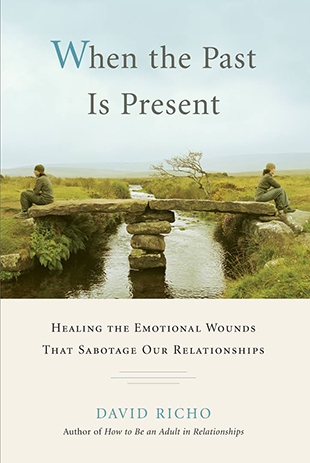"A helpful way to handle regrets is to place them in a larger space than memory provides. Instead of thinking of regrets as happening in our memory, which has narrowed to receive them, we imagine that they have opened a space for practice. Then memory is not simply happening to us but is a launching pad for awakening.
"Verbally or in our journal, we can say yes to all that has happened to us and to all the choices we made. We can bless and release them without the self-blaming mind-sets of ego. This happens as we settle into equanimity with the reality of what is and what was. Such acceptance of our own reality leads us to take the next step in our lives. Then we know that regret has been integrated.
"We have all heard of learning from our mistakes. For instance, we learn not to touch a hot stove. That is a simple lesson based on the reaction of pain. Yet we may keep going back to painful relationships because we have not yet grasped a way to place an original painful relationship in a context of life learning. Instead, we may seek future relationships that are just as bad for us. When this happens, we are in the grasp of a 'repetition compulsion,' an irresistible need to repeat rather than get beyond our past. How, then, do we learn and change in the area of relationship?
"We address the problem when we recognize how we seek partners who hurt or disappoint us. We process the problem as we grieve for ourselves and realize that our choices hearken back to the past. Within a relationship, resolving includes making a new agreement, breaking out of the dysfunctional pattern. We resolve by letting go of the latest candidate to continue the history of hurt, with no retaliation but with compassion for ourselves and her. We integrate when we insist that others honor our boundaries and not hurt us purposely. This leads to an increase in self-esteem. Now we see how we grow from our mistakes, not just learn from them.
"Some spiritual practices place the emphasis on letting go of attachment so that we will not experience disappointment at all or ever again. This seems suspiciously like an entitlement to an exemption from a given of life. Without disappointment, we might lose opportunities to become people of more depth, character, and compassion. Do we really want to be so careful about avoiding suffering that we become closed to the kinds of pain that humans were meant to feel so they could grow? Do we want a spiritual practice that makes us so far removed from the rest of humanity that we cannot understand their suffering? Do we really want to use our spiritual practice to gain full control over human hurt?
"In my own life I have noticed that my worries and regrets have a shorter shelf life now than they did before I began my spiritual practices. The nagging thoughts lose their wallop faster than they used to. The regrets become flatlined memories rather than the obsessive barbs that once they were. This has been a welcome boon, and I give thanks when I notice it. The attitude of gratitude seems to compel the demons to retreat sooner and to persuade the angels to hang around longer.
"Our spiritual practice can mature so much that it now grants us the graces of healthy comfort in our griefs and healthy challenges on our journey. This happens as we allow our regrets and disappointments and grieve them. Then we say with the Nobel laureate Dag Hammarskjold:
"For all that has been: Thanks.
For all that shall be: Yes."
